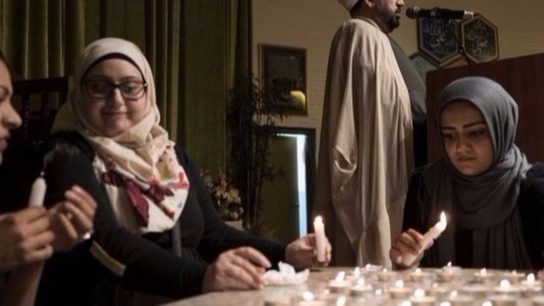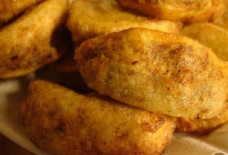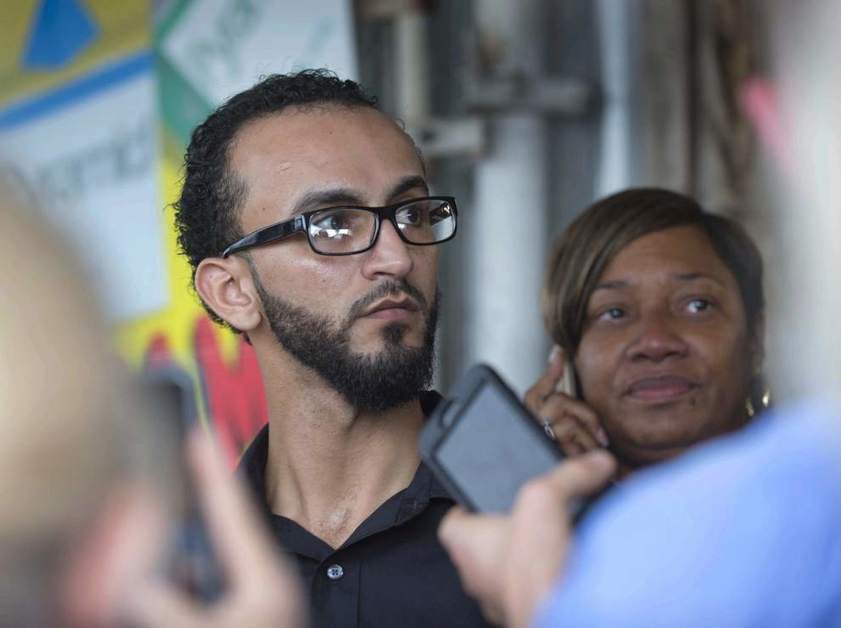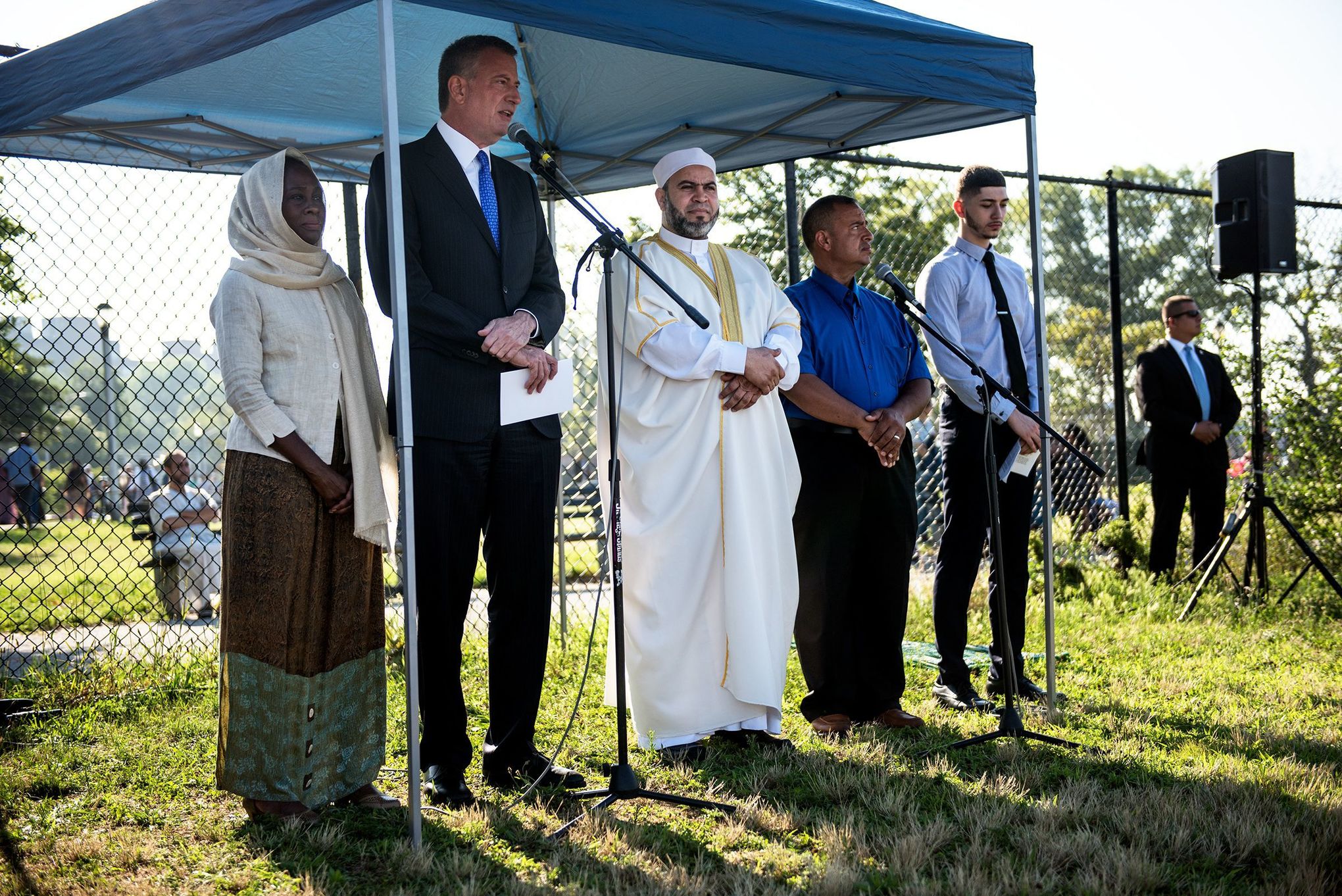
Niraj Warikoo
Detroit Free Press
In the main aisle of a mosque in Dearborn Heights on a recent night, a member of the LGBTQ Muslim community approached the pulpit.
The religious leader of the Islamic House of Wisdom, Imam Mohammad Ali Elahi, had just concluded his remarks at a vigil his mosque organized for the victims in Orlando and others killed by terrorism. And now, Elahi was about to lead the worshippers in lighting candles and reciting prayers for the victims.
But Noura, 22, of Detroit had some concerns.
“Excuse me,” Noura said to Elahi, a few feet in front. “I just want to be clear. Who are we lighting this vigil for?”
Elahi replied: “This is a candlelight (vigil) for all victims of violence, hatred and terrorism from Orlando to California to Paris” and elsewhere.
Noura cut him off.
“No, this is about Orlando,” said Noura, a Lebanese American raised female who now identifies as a transmasculine Queer Muslim. “This is why we’re here. We’re here for Orlando. We’re here for the queer people.”
The tense scene at the Islamic House of Wisdom on June 16, a few days after the Orlando shooting at a gay nightclub, illustrates how the Muslim-American community, has been dealing with LGBTQ issues in the aftermath of the worst terrorist incident in the U.S. since the Sept. 11 attacks. Some reports have said the shooter, a Muslim, may have been wrestling with his sexual orientation.
Politicians such as Donald Trump have sought to use the attack to stereotype Muslims, saying they are hostile to the LGBTQ community. The day after the Orlando shooting, Trump gave a speech that reiterated his call to ban Muslims from entering the U.S., saying that radical Muslims want to “murder gays” while describing himself as a “friend of … the LGBT community.”
“Radical Islam is … anti-gay and anti-American,” Trump said in New Hampshire.
But LGBTQ Muslims in metro Detroit and across the U.S. bristle at Trump’s remarks, saying they oppose any attempts to divide Muslims and gays. On Tuesday, 65 Muslim and LGBTQ groups released an open letter through the group Muslim Advocates urging unity and condemning attacks on both communities. And leaders with the Muslim Alliance for Sexual and Gender Diversity held a press call denouncing homophobia and Islamophobia. They seek to carve out a unique voice, one that speaks out against both anti-gay and anti-Muslim sentiment.
“I’m kind of saddened at the fact … of attempts to utilize such a tragic event to push political agendas with Islamophobia, attempting to essentially pit communities against each other, without taking into consideration there are Queer Muslims,” said Noura, who asked that a last name not be used for privacy reasons. “If a Christian person had done (the Orlando shooting), nobody would have been like, ‘Christianity is horrible,’ but because he’s Muslim, there are political agendas.”
Noura said that some are trying to say “your identities are at war, you either belong to this community or this community, and you have to choose.”
But for Noura and others, they feel connected to both communities: Muslim and gay. Metro Detroit has a sizable LGBT Muslim community with groups and forums created over the years to share similar experiences.
In 2004, Al-Gamea, an Arab-American group for the LGBT community that includes Muslims, was established, holding Arabian Nights at a LGBT club in Ferndale. In 2013, a two-day conference called the Queer Muslim Gathering was held in Detroit that featured LGBT Muslims from across the U.S. Some in Michigan attend an annual conference for LGBT Muslims held every May in Philadelphia. And the first gay Muslim religious leader in the U.S., Imam Daayiee Abdullah, is a native of Detroit raised as a Southern Baptist by African-American parents on the east side of the city. Abdullah converted to Islam while studying in China, developing a liberal view of the religion.
“The Orthodox … continue to promote the mythology that Quranic ethics requires the dismissal of homosexuality and in some instances, even the destruction of LGBT people,” said Imam Abdullah of Washington, D.C., director of the Mecca Institute, which develops a progressive and inclusive interpretation of Islam. “If they knew their Islamic history … there’s been many different types of Islams, and in those Islams, sexual diversity was something that was never sequestered, hunted down, or put into a position where they couldn’t exist.”
Imam Abdullah and Noura say that the lack of awareness among Muslims on this leads to incidents like the Orlando shooting, which involved a suspect who may have been struggling with his own identity.
“He needed a community like this, he needed a group that doesn’t say, he was an abomination,” Noura said. “He wouldn’t have had so much hate and anger towards himself. … It comes down to loving. Love is a radical act. The most radical thing we can do is to love.”
For Noura, that love is tied to faith.
“That’s what Islam means to me: love,” Noura said. “I learned to love through Islam.”
Noura was born in Beirut and moved to Dearborn along with Noura’s Muslim parents at a young age.
“I was raised very religiously” and still feels strongly tied to Islam, Noura said. For Muslims, it’s currently the holy month of Ramadan, which Noura observes. “Ramadan is absolutely my favorite time of the year.”
Noura came out to the family at 19.
“There was some struggle,” Noura said. “It took me years to accept the fact that I’m gay … my family had a hard time, but love overcame all of that.”
Raised as a girl, Noura today doesn’t use “she” or “he” as a label.
Nour said that “in the Arabic community, we don’t even talk about sex or sexuality” and so discussions about being gay can be challenging. Noura said the Orlando shooting “may be a wake-up call for us to start making moves in our community” to fight homophobia.
But Noura added that such types of struggles are in other religious and ethnic groups, not just among Muslims: “There’s homophobia in every community.”
Noura and Abdullah face challenges because Muslim leaders and the main schools thought in Islam generally see same-gender sexual relations as a sin, as do the Catholic Church, the biggest Protestant denomination in the U.S., Southern Baptist Convention, and Orthodox Jews. Muslim leaders often cite Jewish and Christian views against homosexual acts to defend their views, but at the same time, strongly condemn any violent actions against gays.
“In no way do we accept violence, hatred, insults and attacks on any group, including the gay community,” Elahi told the crowd at the vigil. “If homosexuality is a sin based on Abrahamic traditions, attacking people and murdering in such a barbarian way is even a more serious sin. You cannot remove a sin with another sin. You cannot fight injustice with injustice. The ends never justify the means. We live in a country of separation of church and state under a beautiful constitution and declaration of independence that says all men were created equal.”
Imam Mohammad Mardini of the American Muslim Center in Dearborn agreed and said of Orlando: “Anyone who commits an act of violence against innocent people, he’s under no circumstances belonging to Islam or the Muslim community.”
Like most other imams, Mardini said that “all the religions of God, from Judaism to Christianity to Islam” believe that same-gender sexual relations are wrong. They point to the story of Sodom and Gomorrah in the Bible, which is referred to in the Quran, Islam’s holy book. The story describes the destruction of a society after sexual activity among men.
“It’s not only in the Quran, it’s in the Torah, and Bible,” said Imam Hushasm Al-Husainy of the Karbala Islamic Educational Center in Dearborn. “It’s a sin .. .but we don’t come and kill them like (in Orlando). You talk to them, you advise them, you help them.”
Imam Abdullah, the openly gay Muslim leader, said the Sodom and Gomorrah story is actually about the abuse of power and rape rather than consensual sexual activity. Moreover, he argues that many of the laws against same-gender sexual relations came from the West and British colonial rule, rather than from the Muslim world. Abdullah said the influence of Saudi-funded institutions have prevented Muslims in the U.S. from reforming and being more open.
Faith and controversy
The issue came to the forefront in the days after the Orlando shootings when reports surfaced of a lecture given in April 2013 at the University of Michigan-Dearborn hosted by a campus Muslim group on homosexuality and Islam.
In his Dearborn talk, posted on YouTube, Iranian cleric Farrokh Sekaleshfar, said of same-gender sexual acts: “Death is the sentence. … There’s nothing to be embarrassed about this. Death is the sentence.” He added: “We have to have that compassion for people. With homosexuals, it’s the same. Out of compassion, let’s get rid of them now.”
In March, a local TV station in Florida reported that Sekaleshfar was scheduled to speak at a mosque near Orlando, citing his anti-gay remarks made in Dearborn three years ago. After the Orlando shootings, the report circulated online, leading to outrage by officials in Australia, where Sekaleshfar was visiting. After Australia’s prime minister suggested he should not be allowed in the country, Sekaleshfar left on June 14 for his native Iran.
In an interview with the Australian, Sekaleshfar said he strongly condemned the Orlando attacks, and that his Dearborn talk was more of a legal discussion about how homosexuality is dealt with in Muslim countries. He said he was talking about the legal standard for the death penalty, which would required having public witnesses of sexual acts between two men.
In his talk at the vigil in Dearborn Heights, Imam Elahi criticized the attacks on Sekaleshfar, saying he was talking about the “jurisprudence of Muslim countries,” which he said requires four trustworthy witnesses to say sodomy took place between two men, a standard that is virtually impossible to achieve and so the death penalty is not carried out in reality.
Elahi said that Muslims were being singled out for criticism on LGBT issues while some Christian pastors in the U.S. were openly supporting the Orlando attack, such as Pastor Roger Jimenez of California.
“The forces of Islamophobia used this opportunity in a very unfair way to attack Muslims,” Elahi said.
Feeling unsafe
Asadullah Muhammad, 35, of Detroit was raised Presbyterian by immigrants from Jamaica, but felt an emptiness when he went to church.
At Hampton University, a historically black university, he learned about the Nation of Islam through their events like the Million Man March and then converted to Sunni Islam.
Moving to Atlanta, he married a woman and had three children, struggling with internal homophobia before coming out as gay when he was 28.
He cringes when he hears homophobic rhetoric from Muslim leaders and others.
When faith leaders attack gays, said Muhammad, “it’s like someone is violating you and makes you feel unsafe, and not have trust and you live in fear.”
Muhammad said he’s sometimes reluctant to go to the mosque because “it’s hard to pray next to someone who if they knew more about you, they could potentially hate you, want to hurt you, not want to pray with you. I don’t want to have to carry secrets in places that are meant to build you up spiritually.”
“I’ve had to be in defense mode, from others who say, You can’t be Muslim and gay, you can’t be Jamaican and gay.”
But despite the challenges, Muhammad said, “I feel like I will always feel a connection to Islam. The definition of a Muslim is one who submits to God … every living thing is Muslim. I feel a connection to Ramadan. I don’t judge myself if I’m not practicing Islam in a way that anyone says I need to practice it. I give myself a certain spiritual freedom that I think has allowed me to express my curiosity about other beliefs.”
“For too long, I’ve allowed people to police me spiritually.”
For Muhammad and others, being openly gay is also about living with honesty and integrity. They say that some Muslims lead gay lives, but in secret.
“There’s a thing line between privacy and shame,” Muhammad said. If the Orlando shooter had been able to find a space for himself for being both Muslim and gay, he might not have developed such a murderous rage, Muhammad said.
For Muhammad and Noura, the support of family has helped them in their journeys. “I’m proud to say I have two Jamaican parents who came from an island known for its homophobia who love me dearly and accept me.”
Noura said that after coming out, siblings were supportive, saying to Noura: “‘I don’t care what you are, you’re my sibling and I love you. I may not agree with what you do, but Islam tells me to love, no matter what.’ That’s the Islam I was raised with.”
“My siblings’ reaction to me made me fall in love with Islam so much more,” Noura said. “Through Islam, I learned to love and build community.”
At the vigil where Noura spoke out, Elahi politely responded to Noura’s concern that it did not solely focus on Orlando. Elahi noted that the flier announcing the event mentioned Orlando, as well as other victims.
“We appreciate your intention, but we are one in this and we don’t want to impose,” Elahi said to Noura. “I cannot impose my belief on you and you cannot impose your belief on somebody else. … It is a prayer for all those who are victims of violence in general, so let us have a moment of silence, please.”
With lit candles in their hands, the crowd listened as Elahi recited prayers in Arabic and English, while Noura left the auditorium for the hallway.
“From victims in Orlando to California to Paris to Pakistan to Istanbul to Syria to Baghdad to Beirut to Kabul to Cairo to everywhere people are victims of violence and terrorism, please help us oh Lord, to be one voice, one nation, one community, against extremism, terrorism, ignorance, injustice, Islamophobia,” Elahi said, holding a candle in his left hand.
“Bless us with wisdom, with unity, with love, with being one nation under one God.”
Source: www.wusa9.com





